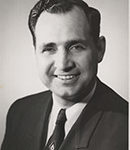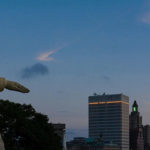Fireworks flashed a little less brightly and boomed a little less loudly this Fourth of July. Earlier that day, James Dunn left America for heaven. Our republic is a little less free and a smidge less strong for his passing.
But how perfect that James Dunn died on Independence Day. James believed the soul is free, and he dedicated his life to battling for religious liberty for all people.
 Editor Marv KnoxIf Baptists carved their stalwart champions of religious liberty on the side of a mountain, at least four faces would peer down upon us—Thomas Helwys, an original Baptist who died in a 17th century London prison for telling King James I that God, and not his majesty, is Lord of conscience; Roger Williams, founder of the first Baptist church in America, who established Rhode Island Colony as a haven of liberty for people of all faiths and no faith; George W. Truett, the late pastor of First Baptist Church in Dallas, who delivered the greatest speech on religious freedom in the 20th century; and James Dunn, executive director of the Baptist Joint Committee on Public Affairs 1981-99 and peerless advocate for what he called “soul freedom.”
Editor Marv KnoxIf Baptists carved their stalwart champions of religious liberty on the side of a mountain, at least four faces would peer down upon us—Thomas Helwys, an original Baptist who died in a 17th century London prison for telling King James I that God, and not his majesty, is Lord of conscience; Roger Williams, founder of the first Baptist church in America, who established Rhode Island Colony as a haven of liberty for people of all faiths and no faith; George W. Truett, the late pastor of First Baptist Church in Dallas, who delivered the greatest speech on religious freedom in the 20th century; and James Dunn, executive director of the Baptist Joint Committee on Public Affairs 1981-99 and peerless advocate for what he called “soul freedom.”
As his obituary notes, James was born, raised and educated in Fort Worth. He served the Lord and Baptists as a pastor, campus minister and professor. Then he led the Texas Baptist Christian Life Commission before heading to Washington the same month Ronald Reagan became president to lead the Baptist Joint Committee.
His achievements were many
Among James’ crowning achievements were leadership in passing the Equal Access Act (1984), which guarantees religious groups the same right to use public school facilities as other student organizations, and the Religious Freedom Restoration Act (1993), which continues to ensure religious freedom protections, particularly for minority groups.
In retirement, James taught Christianity and public policy at the Wake Forest University School of Divinity for 14 years, shaping a generation of ministers.
You can read a tremendous retrospective of James’ life and ministry here. A retirement tribute delivered by his friend Bill Moyers is available here. His biographer’s page is here. And a review I wrote of that biography is here.
Upon his home-going, I want to offer a few words about my friend, whose presence in my life extends back past my memory.
Sign up for our weekly edition and get all our headlines in your inbox on Thursdays
On numerous occasions—usually at banquets or other Baptist meetings—James and I would find each other and exchange hugs. And then, almost without fail, James would tell everyone within earshot, “I’ve known Marv so long, I used to change his diapers.”
I can neither affirm nor deny that assertion. Actually, I don’t remember anyone who changed any diapers. But he very well may have changed my diapers.
My earliest memory of James
What I hold dearly is my first memory of James.
When I was a little boy, James was the Baptist campus minister at West Texas State University (now West Texas A&M) in Canyon. My father was pastor of small churches in the Panhandle. Our congregations couldn’t afford full-time youth ministers, but James would help us find a summer youth worker from among the kids who participated in his Baptist Student Union.
One spring when I probably was 3 or 4, but certainly no older than 5, Daddy took me with him to Canyon to see James and to interview prospective summer youth workers. I’m not sure how long we stayed on campus. But my mind still holds a vivid image of James standing out in front of the BSU building, waving goodbye to us as we drove away. I can close my eyes, and I’m looking out the car window at a very young smiling-and-waving James.
Many years later, I pondered why I still recalled that image of James from long ago, when I was so very young. And the answer is easy: James was the kind of guy who, with everything else going on, took plenty of time to talk to and pay attention to a little boy tagging along in his daddy’s wake. I remembered him not because of the quality of his wave, but because he spent the day caring about—loving—me.
Almost 20 years later, when I took my first Baptist job as a reporter at the old Home Mission Board in Atlanta, one of the first people who called with congratulations was James. Fortunately for me, we saw each other several times a year the rest of his life, and every occasion was a blessing.
An army of ‘best friends’
And here’s the kicker: I was not alone. As word of James’ death spread, Facebook lit up with tributes, memories and photographs from a host of people who also loved James. He possessed the uncanny, unselfish and unpretentious ability to make all his friends feel special. James attracted an army of “best” friends.
We all are richer, stronger, more whole and—those of us who are—better Baptists for having known him, having been his friends. And we’ll all have to stand a little stronger for religious liberty, because James could fight that fight better than all of us put together.














We seek to connect God’s story and God’s people around the world. To learn more about God’s story, click here.
Send comments and feedback to Eric Black, our editor. For comments to be published, please specify “letter to the editor.” Maximum length for publication is 300 words.